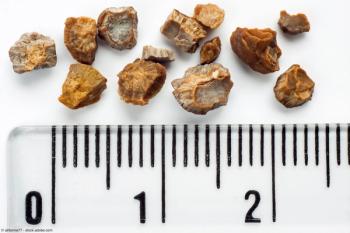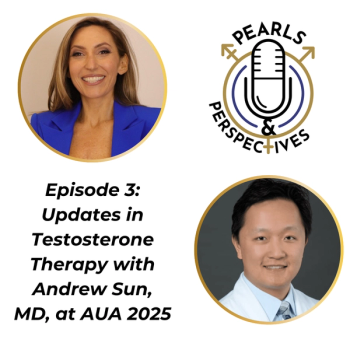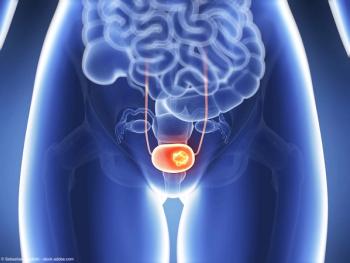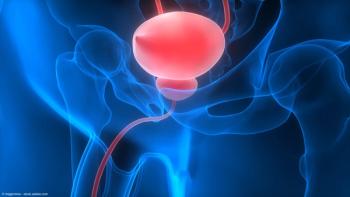
In this episode, guideline chair Melissa Kaufman, MD, PhD, FACS, highlights key points from the new AUA GSM guideline and illustrates its impact for clinical management of this condition.

In this episode, guideline chair Melissa Kaufman, MD, PhD, FACS, highlights key points from the new AUA GSM guideline and illustrates its impact for clinical management of this condition.

The investigators reported a median stone clearance of 96.44%.

New research reveals GLP-1 receptor agonists may enhance sperm counts in overweight men.

In cohort A, the cystectomy-free rate at 36 months was 84%.

This episodes explores the evolving role of GLP-1 medications in testosterone management and their impact on male sexual health and fertility.

More than 80% of patients in both groups had a full recovery of testosterone.

Andrew Sun, MD, joins Pearls & Perspectives to discuss innovative approaches to testosterone therapy for enhanced health outcomes.

"I would argue that UGN-102 may very well represent a well-tolerated alternative to TURBT as primary treatment for patients with low-grade disease,” says Sandip M. Prasad, MD, MPhil.

Helen Bernie, DO, MPH, joins the show to discuss data from her Indiana University team from the floor at AUA 2025.

A phase 3 trial reveals a combination therapy for premature ejaculation significantly enhances treatment outcomes.

The investigators reported that the median Kaplan-Meier estimate of DOR was 24.2 months.

"97% [of patients] remain progression free, and 84.5% avoided cystectomy, highlighting cretostimogene’s bladder-sparing potential,” said Mark D. Tyson II, MD, MPH.

New research links higher drinking water contaminants to increased kidney stone risk.

“In the patients with CIS, the probability of a continued complete response at 36 months was 92% vs 67.7%," said Neal D. Shore, MD, FACS.

A groundbreaking male contraceptive shows promising safety results, offering a reversible option for couples seeking effective birth control.

Treatment with TARA-002 was associated with a 100% high-grade CR at any time in BCG-unresponsive participants.

Social media spreads significant misinformation about prostate cancer. Experts urge clinicians to provide trusted information sources.

Clarius Mobile Health said it will be demonstrating the application at the AUA Annual Meeting in Las Vegas, Nevada.

The RAPID-III trial will assess outcomes with flexible cystoscopy with or without the FloStent implant deployed.

"What is truly exciting is the potential for this device to meaningfully improve early and long-term continence rates, which can profoundly impact a patient's recovery and overall quality of life,” says Patrick Daily, MD.

Host Amy Pearlman, MD, discusses premature ejaculation with Brian L. Steixner, MD, a board-certified urologist in Linwood, New Jersey.

Data from the SOUND trial are intended to support submission for FDA 510(k) clearance of the Break Wave device.

View slated interviews with experts as well as insights from urologists on what to watch for.

"In this large study of over 1500 men with an elevated PSA, we found that a low IsoPSA is incredibly reassuring,” says Christopher J. Weight, MD.

"We’ve achieved a lot, but the focus now must shift from cure alone to comprehensive, patient-centered care," says Vladimir Hugec, MD.

Take a look through several of the notable phase 3 trials in progress that will be spotlighted at AUA 2025.

"The AACU has been discussing the evolution of state policy to ensure that biomarker testing, including PSA screening, is covered by payers," writes Ron Lanton, Esq.

Pearls & Perspectives, hosted by Amy Pearlman, MD, is the latest multimedia program from Urology Times.

Treatment with nadofaragene led to a complete response rate of 75% at 3 months.

We preview several noteworthy P2 presentations in the urologic oncology space.